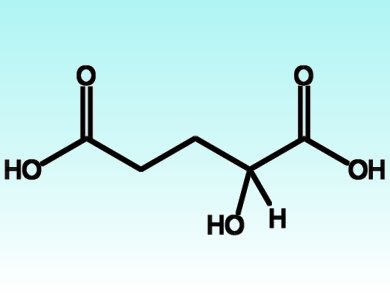Acute myeloid leukemia (AML) is a blood cancer characterized by a hyper proliferation of white blood cells. Mutations in isocitrate dehydrogenases, enzymes converting isocitrate into α-ketoglutarate, often occur in AML patients. Their precise pathogenic role, however, remains elusive.
Julie-Aurore Losman, Dana-Farber Cancer Institute, Boston, USA, and colleagues revealed that the (R)-enantiomer of 2-hydroxyglutarate (HG, pictured) plays a crucial role in the development of the leukemic disease. The compound, abnormally produced by isocitrate dehydrogenases as a consequence of their mutations, accumulates in blood cells and deregulate their proliferation, thus promoting the leukemic transformation. (R)-2-HG effects are, however, reversible, as compounds blocking its production could restore a normal cellular growth. Thus, the pharmacological inhibition of (R)-2-HG production might be a valuable therapeutic intervention against acute myeloid leukemias.
- (R)-2-hydroxyglutarate is sufficient to promote leukemogenesis and its effects are reversible,
J. Losman, R. Looper, P. Koivunen, S. Lee, R. K. Schneider, C. McMahon, G. Cowley, D. Root, B. L. Ebert, W. G. Kaelin Jr,
Science 2013.
DOI: 10.1126/science.1231677




